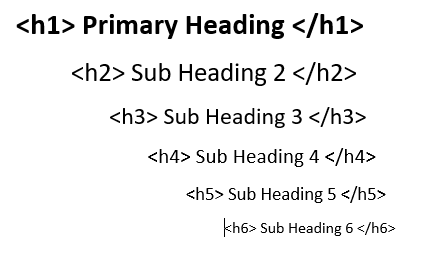How to Optimize Your Page Headings
Every SEO professional knows that a page with good headings is more likely to rank well on search engines. Headings help readers and Google, understand what a particular page is about. With headings, readers are more easily able to navigate to the information they are searching for. This is very important as most internet users don’t stick around to read a page word-for-word.
With headings being a standard requirement for any webpage, we’ve decided to take a look at how content creators can get the most out of them. So, read on to find out how to optimise your headings for the best rankings.
What is a Heading Tag?
A heading is set of words which uses HTML code (more specifically, heading tags) to stand out on a webpage. It tells readers what the page is about and helps them decide whether they want to read it or not.
More importantly, it also tells Google what the page is about. Ultimately, the title, along with other key page factors (such as meta titles, descriptions and keywords) help determine which keywords or phrases the page will rank for.

There are six heading tags in HTML ranging from H1 to H6. The H1 heading tag is the HTML tag for the largest heading. It is the most important on a webpage. It is largely considered to be the traditional “title” of the page, but should not be confused with a page’s meta title. Rather think of it in terms of a magazine or newspaper article heading. (Find an H1 heading tag example down below.)
The other SEO heading tags (H2 to H6) help direct readers to relevant content. Effective sub-headings help readers navigate to the information most important to them.
Why are SEO Heading Tags Important?
With regards to headings and their direct connection to rankings, opinion on the topic is somewhat divided. Many studies suggest that they may not really affect rankings that much. However, they do make a page’s content easier to digest, and this may lead to other metrics that affect search engine rankings.
As previously stated, headings help readers understand what a page is about. Remember that if people are able to understand what a page is about, Google is probably able to as well.

Studies performed by Forbes and the Nielsen Norman Group indicate that 80% of people are more likely to scan content, when reading online than read the page word-for-word. This is due to two major reasons:
- Many web users feel that it is hard to read on a screen.
- Web pages often have many elements competing for a reader’s attention (adverts, images, etc.)
Headings help readers zone into the area that matches their needs most. If they are able to find the information, they’re looking for quickly; they’ll stay on your page longer. It improves the user experience and this easily translates into a reduced bounce rate.
Pages that readers deem helpful and to the point are also more likely to be shared. This is a natural increase in site backlinks, which helps improve rankings.
How to Optimize Your Page Headings Guide
If you write your content with the following tips in mind, you will see improvements in site rankings.
- Use One H1 Per Page – A page should only ever have one H1. While Google doesn’t fault your page for having more than one H1, you don’t want any other information to be of the same importance on the page as the “title”. For example, the headings listed below have all been given the same level of importance. However, only the first heading is representative of what the page is about.

- Use H2s Strategically – Some sources, such as Yoast and Post-Modern Marketing, suggest that you should limit the number of H2s you use. These sources suggest that having too many H2s can be bad for your on-page SEO, and could have a negative effect on rankings. Ultimately, the length of your content should determine how many headings you use.
- Use Keywords (But Wisely…) – Aim to include keywords in your headers. Your H1 must contain your focus keyword, and you should try aim to include a few additional secondary keywords in some of your H2s. (It is suggested that you aim to go for featured snippets with H2 headings, so try to use long-tail keywords here.) However, never compromise your page’s readability with keyword stuffing.
- Make Headings Descriptive – Your H1 should get people to read the article. Don’t be clickbaity, but get to the point quickly. Just say what you mean. You should make sure that your headings clearly explain the topic’s core points. For example:

- Be Consistent in Styling – If your site’s theme allows you to differentiate between upper and lower case characters, be consistent with the way you present your headings. If you capitalise each word on one page, do so throughout your site.
Wrapping Up Why You Need to Use Headings
Headings are an important part of creating good content. They help make content more readable and encourage readers to stick around thereby reducing bounce rate. Ultimately, a page with good headings will rank better than a page without headings.
Do you have any tips for creating effective page headings? Please share in the comments down below.
TL:DR? Get our summary here: How to Optimize Your Page Headings


